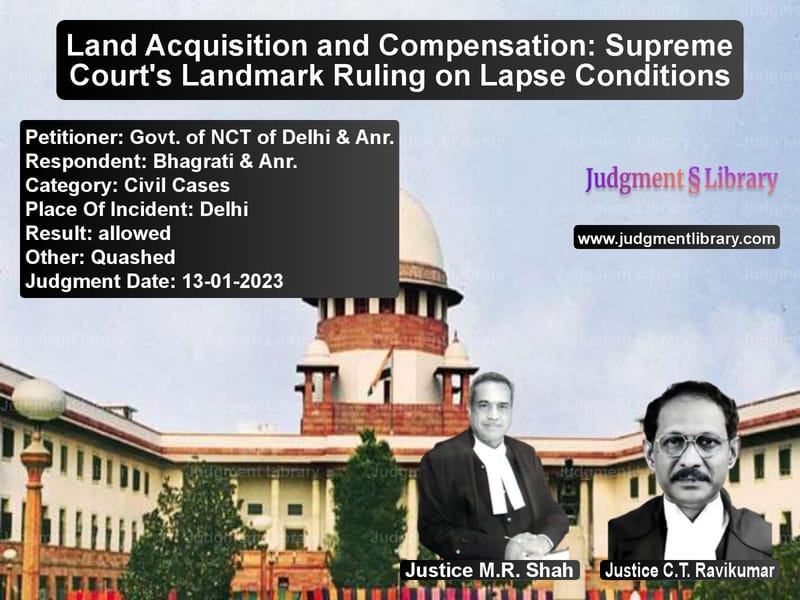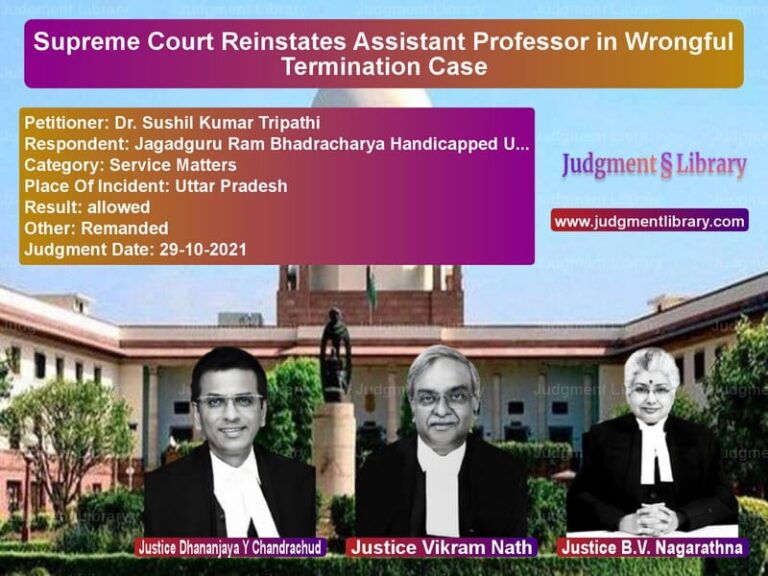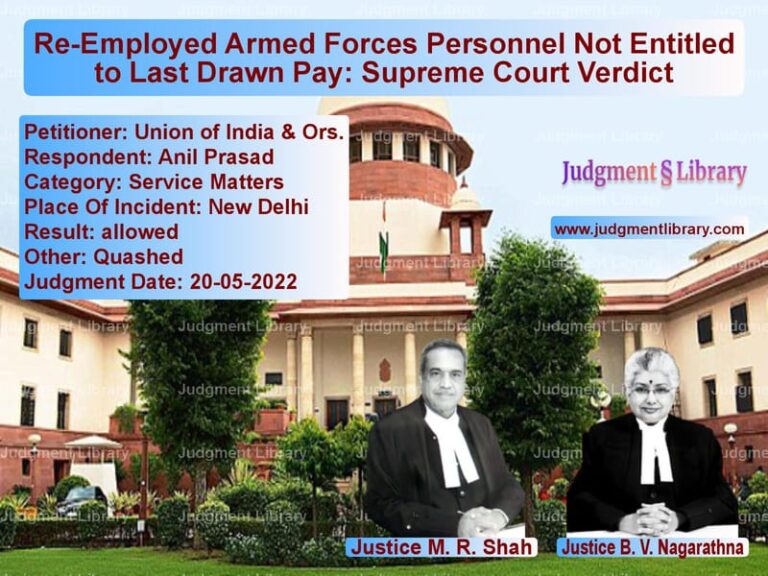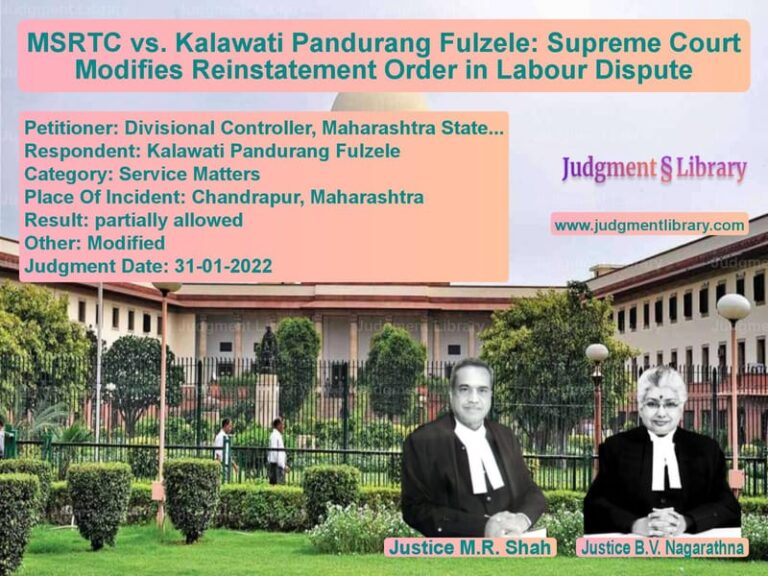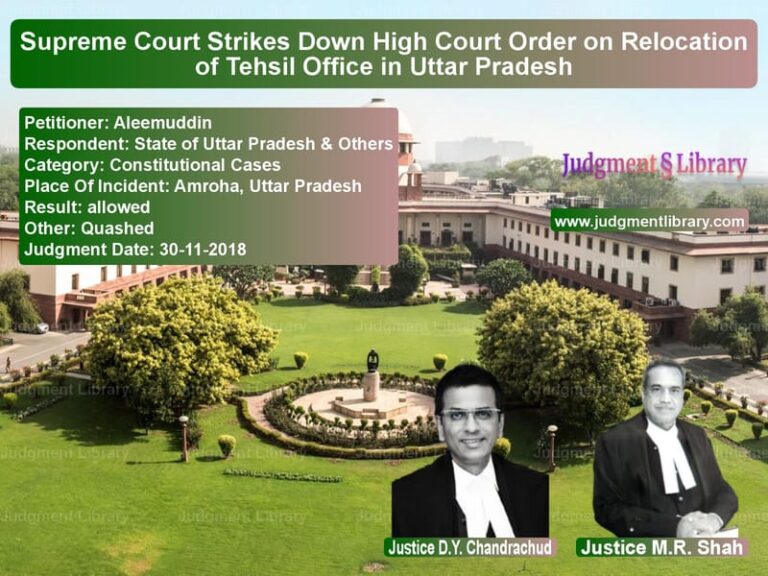Land Acquisition and Compensation: Supreme Court’s Landmark Ruling on Lapse Conditions
The case of Govt. of NCT of Delhi & Anr. v. Bhagrati & Anr. is a significant judgment that deals with the applicability of Section 24(2) of the Right to Fair Compensation and Transparency in Land Acquisition, Rehabilitation, and Resettlement Act, 2013. The Supreme Court analyzed whether land acquisition proceedings had lapsed due to non-payment of compensation and whether possession had been taken by the authorities. The ruling clarifies legal ambiguities and prevents landowners from misusing the provisions of the 2013 Act to challenge past acquisitions.
Background of the Case
The dispute originated when the Delhi High Court ruled in favor of the landowners, declaring that the land acquisition had lapsed under Section 24(2) of the 2013 Act. The Government of NCT of Delhi challenged this decision before the Supreme Court, arguing that possession had been taken, and compensation had been duly provided as per the legal framework.
The land in question was acquired under the Land Acquisition Act, 1894, and the acquisition award was declared on June 19, 1992. Possession of the land was taken on March 21, 2007, and handed over to the Delhi Development Authority (DDA). However, the original writ petitioner, who claimed ownership over a 1/12th share of the land, challenged the acquisition process on the grounds that compensation was not paid.
Legal Issues Considered
The Supreme Court examined the following key legal questions:
- Whether the acquisition proceedings had lapsed due to non-payment of compensation.
- Whether possession of the land had been taken by the authorities as per legal requirements.
- Whether the High Court erred in applying the Pune Municipal Corporation ruling, which had been subsequently overruled by the Supreme Court’s Constitution Bench in Indore Development Authority.
- Whether a petitioner who is not the recorded owner has the legal standing to challenge land acquisition proceedings.
Arguments by the Appellants (Govt. of NCT of Delhi)
The Government of Delhi presented the following arguments before the Supreme Court:
- The land acquisition award was declared on June 19, 1992, and possession was taken on March 21, 2007.
- The land was handed over to the Delhi Development Authority (DDA) after proper documentation and possession proceedings.
- The original writ petitioner was not the recorded owner of the land and had no legal standing to challenge the acquisition.
- The recorded owner never came forward to claim compensation, and therefore, the amount remained unpaid.
- The High Court relied on the Pune Municipal Corporation case, which was later overruled in Indore Development Authority, making its judgment unsustainable.
- As per the Constitution Bench ruling, both conditions (non-possession and non-compensation) must be met for acquisition to lapse under Section 24(2) of the 2013 Act.
Arguments by the Respondents (Bhagrati & Anr.)
The respondents, on the other hand, contended that:
- The compensation had not been paid, which should result in the acquisition being deemed as lapsed.
- They remained in possession of the land despite government claims that possession had been taken.
- Since compensation remained unpaid, the acquisition should be declared void under Section 24(2) of the 2013 Act.
- The High Court’s decision was in line with the legal interpretation set forth in Pune Municipal Corporation.
Supreme Court’s Judgment
The Supreme Court ruled as follows:
- High Court’s reliance on the Pune Municipal Corporation case was incorrect: The Court noted that this ruling had been explicitly overruled in Indore Development Authority, which clarified that the conditions for lapse under Section 24(2) require both possession not being taken and compensation not being paid.
- Acquisition does not lapse if possession has been taken: The Court reaffirmed that under Section 24(2), both conditions must be satisfied for lapse to occur.
- Since possession was taken, acquisition remains valid: The Court found that government records confirmed possession had been taken, making the acquisition legally sound despite non-payment of compensation.
- High Court’s decision was set aside: The Supreme Court ruled that the acquisition remained valid and quashed the High Court’s ruling.
Analysis of the Judgment
The ruling provides much-needed clarity on the interpretation of Section 24(2) of the 2013 Act and prevents landowners from using legal loopholes to challenge completed acquisitions.
Implications for Landowners
- Subsequent purchasers and unrecorded claimants cannot claim lapse of acquisition under Section 24(2).
- If possession has been taken, the acquisition remains valid under the law.
- Landowners who refuse compensation cannot later claim lapse of acquisition.
Implications for the Government
- The ruling strengthens the government’s position in defending land acquisitions.
- Authorities must ensure proper documentation of possession to avoid disputes.
- Land acquisition procedures must be aligned with the ruling to prevent legal challenges.
Implications for Future Land Acquisition Cases
- The ruling provides a definitive interpretation of Section 24(2) of the 2013 Act.
- It prevents unnecessary litigation by clarifying that lapse occurs only when both possession and compensation conditions are unmet.
- Developers and government agencies can proceed with acquisitions without the fear of retrospective legal challenges.
Conclusion
The Supreme Court’s judgment upholds the validity of acquisitions where possession has been taken, ensuring that public projects and development initiatives are not hampered by legal ambiguities. This ruling serves as a crucial precedent for similar cases in the future and reinforces the principle that legal ownership and procedural compliance are essential in land acquisition cases.
Petitioner Name: Govt. of NCT of Delhi & Anr..Respondent Name: Bhagrati & Anr..Judgment By: Justice M.R. Shah, Justice C.T. Ravikumar.Place Of Incident: Delhi.Judgment Date: 13-01-2023.
Don’t miss out on the full details! Download the complete judgment in PDF format below and gain valuable insights instantly!
Download Judgment: govt.-of-nct-of-delh-vs-bhagrati-&-anr.-supreme-court-of-india-judgment-dated-13-01-2023.pdf
Directly Download Judgment: Directly download this Judgment
See all petitions in Property Disputes
See all petitions in Public Interest Litigation
See all petitions in Judgment by Mukeshkumar Rasikbhai Shah
See all petitions in Judgment by C.T. Ravikumar
See all petitions in allowed
See all petitions in Quashed
See all petitions in supreme court of India judgments January 2023
See all petitions in 2023 judgments
See all posts in Civil Cases Category
See all allowed petitions in Civil Cases Category
See all Dismissed petitions in Civil Cases Category
See all partially allowed petitions in Civil Cases Category

